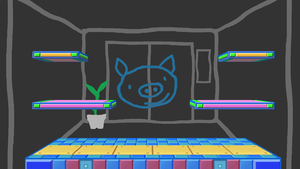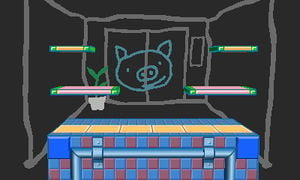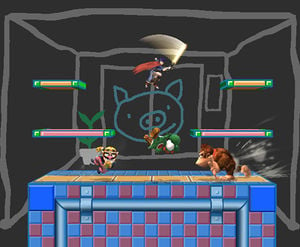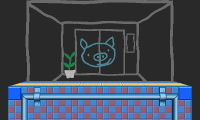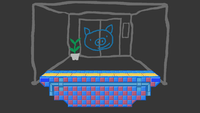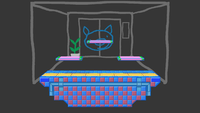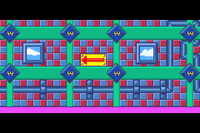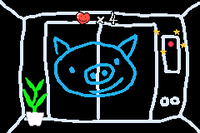WarioWare, Inc.
- This article about the stage. For information about the franchise that the stage is based on, see Wario (universe).
| WarioWare WarioWare, Inc.: Mega Microgame$! WarioWare, Inc. | |
|---|---|
 WarioWare, Inc. as it appears in Smash. | |
| Universe | Wario |
| Appears in | Brawl SSB4 (3DS) Ultimate |
| Availability | Starter (Brawl and Ultimate) Unlockable (SSB4) |
| Unlock criteria | Unlock Wario. |
| Crate type | Presents |
| Maximum players | 4 (Brawl and 3DS) 8 (Ultimate) |
| Article on Super Mario Wiki | Variety Towers |
WarioWare, Inc. (メイド イン ワリオ, Made in Wario) is a stage in Super Smash Bros. Brawl, Super Smash Bros. for Nintendo 3DS, and Super Smash Bros. Ultimate. It takes its name, as well as its theme, from the WarioWare franchise. Often, the stage takes players from the main "elevator" into a microgame, and allows them to compete to obtain some sort of reward. In for Nintendo 3DS and Ultimate, it is where Wario is fought when being unlocked.
Stage overview[edit]
The stage's main setting, the "elevator room", has a simple layout consisting of a main platform that extends below the bottom blast line and four soft platforms, two stacked on either side. Compared to other stages, the blast lines are deceptively close to the camera.
Unique to this stage are the microgames, which allow players to earn rewards when completed. Microgames turn the focus away from the battle and task players with completing a certain goal in an short period of time, such as avoiding an oncoming car or chiseling a statue. Some microgames are even able to damage characters.
Once a game ends, the winners and losers (those who accomplished the goal and those who didn't) are marked with red Os and blue Xs respectively along with Wario making a comment if any players won or if everyone lost. The winners get rewards such as becoming giant, invincible, and damage recovery. In Ultimate, winners may also become metallic. With the exception of "Blowin' Up", the microgames allow for every player to win.
Occasionally, multiple microgames will take place in quick succession. Between microgames, the players will sometimes return to the elevator room, but the stage's platforms will not return, and instead, the players will walk around on an invisible floor, as they do in the microgames. This status of the stage does not last long, though.
In the WarioWare games, microgames had three difficulty levels, which increased as the player progressed through the levels. These have also been implemented in the WarioWare stage, but difficulties seem to be as random as the game selection. For most microgames, the rise in difficulty simply makes it harder to complete. A few of them, however, keep the same task but give a shorter time limit for the players to finish it in. A new microgame begins around every 30 seconds during a match on this stage.
Using the Wii Remote on its own, with the Nunchuk, or with the Classic Controller, the mini-speaker in that controller will play Wario's comment for that player when the microgame ends.
Star KO's can only happen in Brawl. This is because their victim would be obscured in for Nintendo 3DS and Ultimate. Ultimate further removes Screen KOs.
Microgames[edit]
All of the microgames in this stage come from a WarioWare game with the exception of "Don't Move" and "Taunt". The following microgames appear in the stage:
| Name | Command | Description | Image |
|---|---|---|---|
| Arrow Space | Sidestep! | Originates from Mega Microgame$!. A tiny ninja outside a Japanese fortress in the background is the target of a wall of arrows raining from above. In Mega Microgame$!, the player has to move the ninja with the D-Pad into the area where there was a gap between the arrows.
In Super Smash Bros., fighters also have to avoid these arrows, either via moving into the gap similarly to the original game, or by closely navigating to the edges of the stage, putting them in closer proximity to the blast lines. Players who successfully avoid the arrows are given a reward. While the ninja from the original game appears in the background, he has no effects on gameplay. |
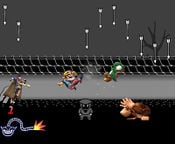
|
| Blowin' Up | Pop it! / Pop! | Originates from Touched!. A series of party poppers appear in the air. In Touched!, the player had to use the stylus to pull the strings on the crackers and make the confetti fire out. The appearance of the stage also changed with the difficulty level, with the image either being that of a birthday, a wedding, or a Halloween party; the Japanese version of the game featured a man with a necktie around his head instead of the Halloween party.
In Super Smash Bros., characters just have to attack the party poppers to set them off; emulating the source game, the image in the background depends on how many poppers there are, though unusually, the image of the man with a necktie around his head appears in all regions. Anyone who successfully attacks a popper will be given a reward, but only if all poppers have been attacked. Due to there being only three poppers, this is the only microgame that does not allow all players to win in a match with more than 3 players. This microgame does not appear if 8 players are present. |

|
| Crack Down | Jump! | Originates from Mega Microgame$!. A giant with a hammer in the background smashes down on a mountain to generate an earthquake, while the player has to make a chicken jump up in the air to avoid the tremor from knocking an egg loose from its back.
In Super Smash Bros., players must accomplish the same feat, gaining a reward if they do so; being on the ground at the time of the tremor will result in being buried and failing the microgame. Unusually, the chicken itself does not appear in the stage. |
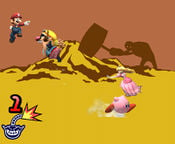
|
| Crazy Cars | Dodge! | Originates from Mega Microgame$!. In the original game, the player controls Wario and has to avoid an oncoming car (represented either as a sausage, a shark, or a potato); the car itself could either charge forward, jump, or stop in place, then either continue charging forward or instead turn away.
In Super Smash Bros., an arrow warns the player of which direction the car will jump, a feature not present in the original microgame. Dodging the car's path grants the player a reward; getting hit by the car inflicts damage with high horizontal knockback. Shielding is not sufficient, even if the player takes no damage; winning the microgame requires avoiding contact with the car altogether. |

|
| Don't Move | Don't move! | This microgame is unique to Smash, although it is inspired by "Fragile!" from Twisted!, where the player had to keep the system completely still to avoid activating the motion sensor and knocking over a stack of eggs.
In this microgame, a marble statue of a man sits in an empty background. In order to beat the microgame, players need to abstain from inputting any sort of command, including attacking, moving, or even shielding. While getting hit by an attack causes the player to move, they will still win the game should they continue to abstain from inputting any commands. |

|
| Kitty Cover | Stay dry! | Originates from Mega Microgame$!. A cat walks around in a rainstorm, and the player originally had to move an umbrella so that the cat would remain dry.
In Super Smash Bros., characters have to stay under the umbrella and not get hit by the rain. The rain does minor damage to all fighting characters as long as they stand underneath it; it does not immediately damage players, however, and it is possible to win the game even if one's character stands in the rain for a brief moment as long as no damage is accrued. In Ultimate only, the umbrella appears a moment before the rain, giving players the opportunity to shelter themselves before the rain starts. This microgame does not appear if 8 players are present. |
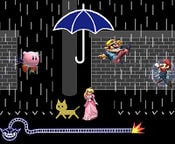
|
| Lose Your Marble | Chisel it! / Chisel! | Originates from Touched!. In Touched!, players have to use the touch screen to chisel away at the block to reveal a statue, which took the form of either an Easter Island statue with lipstick, Michelangelo's David wearing a Speedo, or a statue of a toilet, depending on the difficulty.
In Super Smash Bros., players have to attack the marble block in order to reveal the statue. If the statue is completely unveiled before time runs out, the player who has done the most damage to the marble wins the reward; if the statue is incomplete, then all players lose. |

|
| Sole Man | Dodge! / Look out! | Originates from Mega Microgame$. In the original game, players had to guide Fronk from left to right to avoid being stomped, with higher difficulties featuring wider soles to avoid.
In Super Smash Bros., Fronk does not appear, though members of his species can still be seen in the background. Being hit by the sole causes the bury effect, much like "Crack Down". Players who avoid being hit by the sole are rewarded. |

|
| Taunt | Taunt! | This stage is unique to Super Smash Bros. In the stage, the player must taunt when the camera flashes in order to win; being attacked while taunting still allows for a victory. In the background, Jimmy T can be seen. | 
|
Microgame Music[edit]
The following tracks play during the microgames in Smash, as long as the My Music track in use for the match is WarioWare, Inc. They are all new arrangements from the originals, and cannot be found in the Sound Test.
- Crazy Cars - WarioWare, Inc.: Mega Microgame$!
- Sole Man - WarioWare, Inc.: Mega Microgame$!
- Arrow Space - WarioWare, Inc.: Mega Microgame$!
- Kitty Cover - WarioWare, Inc.: Mega Microgame$!
- Crack Down - WarioWare, Inc.: Mega Microgame$!
- The Maze That Pays - WarioWare, Inc.: Mega Microgame$!
- Blowin' Up - WarioWare: Touched!
- Lose Your Marble - WarioWare: Touched!
- Jimmy T. (Sports) Intro - WarioWare, Inc.: Mega Microgame$!
Ω forms and Battlefield form[edit]
In Super Smash Bros. for Nintendo 3DS, the Ω form removes the soft platforms and the Microgames do not occur. The platform also extends below the blast line.
In Super Smash Bros. Ultimate, the Ω form and Battlefield form are similar to SSB4's Ω form; however, the main platform does not extend below the blast line and is resized and reshaped to match Final Destination and Battlefield, respectively. The three soft platforms of the Battlefield form are based on the pink soft platforms of the regular form.
Hazards Off[edit]
With hazards off in Ultimate, no Microgames are played, and so the stage remains in the elevator for the duration of the match.
Sudden Death[edit]
In Brawl and for Nintendo 3DS, the Microgames would still play during Sudden Death. In Ultimate, however, the Microgames won’t play at all, and so the stage remains in the elevator for the duration of Sudden Death. The same applies for Super Sudden Death.
Origin[edit]
This stage is a mix of three WarioWare games: WarioWare, Inc.: Mega Microgame$! (known in PAL regions as Minigame Mania), WarioWare: Twisted!, and WarioWare: Touched!
The appearance of the main platform originates from the design of walls seen in Wario's house during cutscenes of Mega Microgame$ (albeit with some details removed), while the rest primarly originates from Mega Microgame$'s Variety Tower.
The Variety Tower is a stage that is unlocked after the player completes the final stage in the story mode of the first WarioWare, and draws from every microgame in the whole game, continuing endlessly until the player runs out of lives. It starts off in an elevator with a pig face on the door, which opens up to reveal a microgame. If the player is successful at the microgame, the pig will have a happy expression. If the player fails the microgame, the pig will have a sad expression and crossed-out eyes.
When a microgame starts in this stage or when it ends, a couple of jingles play out during it along with a comment of Wario himself about the players results during the microgames. In Smash, those jingles are new remixes of the jingles that play during the final stage in the story mode of the first WarioWare[1], while Wario's responses are unique to Smash (once again recorded by Charles Martinet), though they are directly inspired by his voice lines heard in various Wario titles, such as the likes of Wario Land 4 (where said voice lines were first heard).
Update History[edit]
- The camera is now closer to the stage.
Tournament legality[edit]
Super Smash Bros. Brawl[edit]
WarioWare, Inc. is banned in tournaments, due to the microgames providing random, disproportionate advantages to whoever completes them, and if both players complete the microgame, they almost never receive the same reward, and rarely receive benefits that can be considered fair or balanced relative to each other. Additionally, the stage layout temporarily transforms into an entirely flat stage with walkoff blast zones, akin to the default form of Bridge of Eldin, whenever a microgame is in progress.
Super Smash Bros. 4[edit]
As for Nintendo 3DS was not the tournament standard format after the release of for Wii U, the stage was very unlikely to see any tournament use, regardless of the above mentioned flaws. However, in the few tournaments that were held, as well as the unofficial online Anther's Ladder matchmaking website, this stage remains banned for all of the same reasons as in Brawl.
Super Smash Bros. Ultimate[edit]
With the introduction of a stage hazard toggle in Ultimate, some early rulesets included the hazardless version of WarioWare, Inc. as a counterpick stage. This immediately proved controversial, however, due to the horizontal blastlines' proximities to the main body of the stage, as well as the uncooperative camera which remains zoomed out for the entirety of the match. Thus, the stage is rarely legal.
Gallery[edit]
Names in other languages[edit]
Trivia[edit]
- If Andross is released from an Assist Trophy while the Brawl is in the main room, he will disappear behind the doors. This also happens with a few Pokémon, such as Lugia and Ho-Oh.
- Both Popo and Nana must win the microgame to be rewarded.
- In Training Mode, even when set to "Stop", the CPUs will still participate in microgames that don't require attacking. This occurs in all games, though the extent is different depending on the game. In Brawl, CPUs will almost always participate; in for Nintendo 3DS they participate less, such as no longer jumping in Crack Down; they participate the least in Ultimate, with one of the few cases being Kitty Cover when set to "Walk".
- In for Nintendo 3DS, in All-Star Mode and Wario's unlock battle, microgames do not take place on the stage.
- In Ultimate, the following Assist Trophies can only appear on this stage's Battlefield and Omega forms: Skull Kid, Color TV-Game 15, Devil, Nintendog, Dr. Kawashima, Yuri Kozukata, Squid Sisters, Ghosts and Shadow the Hedgehog. Additionally, the following Poké Ball Pokémon can only be summoned on the Battlefield and Omega forms: Abra, Moltres, Kyogre, Palkia, Giratina, Arceus, Kyurem, Xerneas and Marshadow. The Timer also cannot appear on this stage.
References[edit]
|
| |
|---|---|
| Fighters | Wario (SSBB · SSB4 · SSBU) |
| Assist Trophies | Kat & Ana · Ashley |
| Stages | WarioWare, Inc. · Gamer |
| Other | 5-Volt |
| Trophies, Stickers and Spirits | Trophies (SSBB · SSB4) · Stickers · Spirits |
| Music | Brawl · SSB4 · Ultimate |
| Related universe | Mario |
